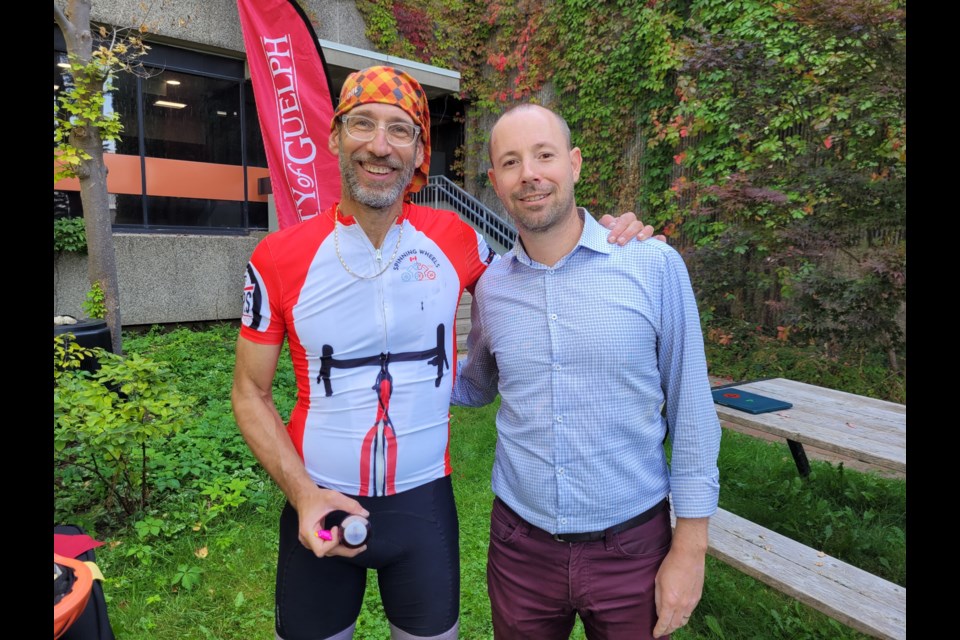Exercise really is the best medicine.
This could not be more true for a group of cyclists called 'Spinning Wheels' who made a stop at the University of Guelph on Thursday.
The riders, who all have Parkinson's disease, are cycling across the country to raise awareness about the disease and to show to people across Canada the benefits of exercise in alleviating and, in some cases, reversing symptoms.
While on campus, the seven cyclists met with U of G cardiovascular physiology researcher Philip Millar from the department of human health and nutritional sciences, who recently published research that explores how exercise can mitigate Parkinson’s symptoms and improve patients’ quality of life.
In a study recently published in the Journal of Applied Physiology, Millar and his co-authors set out to understand how much exercise is needed to improve cardiorespiratory fitness and Parkinson’s disease-related symptoms.
“Prior work found that high intensity interval training may improve how far someone with Parkinson’s can walk but this could be due to becoming more stable or confident in their gait,” Millar said.
“It might have had nothing to do with cardiorespiratory fitness and the impact on motor symptoms was previously never studied.”
Part of Millar's research focused on Steve Iseman, who was diagnosed with Parkinson’s eight years ago and is one of the Spinning Wheels riders who made the stop at the U of G.
"When I'm on a bike, my symptoms abate," Iseman said. "In fact, I learned through testing with professor Millar, that they were able to document not only a cessation of progression, but a retrenchment. Nothing else does that. People have to know. This isn't widely known and it's something that has really transformed my life."
Parkinson's is the fastest growing neurological disease in the world, they said. There is no known cause or cure. The country with the highest per capita rate of diagnosis is Canada.
Research builds on a previous study that included Iseman, who cycled across the country in 85 days.
Cycling significantly reduced his disease symptoms.
"I think this really puts the cherry on the cake of our exercise training study. Steve was a part of that study when he cycled across Canada a few years ago. And so, we took that as a motivating factor for people who live with Parkinsons," Millar said.
"Here's someone who can cycle right across the country. It really shows that there are no bounds to what one can achieve with exercise and continuous training."
The majority of Canadians, upon diagnosis, hide their symptoms and retreat from life. They can become isolated from friends and family and experience depression and anxiety.
Iseman decided to embark on the Spinning Wheels tour two years ago.
"We crossed the country, myself and three other people. We were trying to find people with Parkinson's because a good number of people who have it, go into hiding, just like I did for five years. They are often not connected with their community and kind of go at it alone. We want to find them. So, we ride, town to town, and say, we are here," Iseman said.
"And what we have discovered is that they typically do want to be found."
Spinning Wheels aims to start conversations and raise awareness about Parkinson's, a disease that causes people to experience uncontrollable movements such as tremors, stiffness and difficulty with balance and coordination.
"A person diagnosed with Parkinson’s disease, regardless of their fitness level, often experiences depression and shame," Millar said.
"Given the physical aspects of the disease, patients often stop exercising, which can exacerbate symptoms. If you stop physical activity, your body adapts and you lose physical function."
Millar and Iseman hope to see more awareness spread about the positive impact that exercise can have on people with Parkinson's disease,
Three teams of people living with Parkinson’s are cycling over 10,000 kms, crossing all 10 provinces, two territories and three coasts in 60 days, riding into communities across the country to show the restorative power of exercise and community.
Kelly Kenny, a volunteer with Spinning Wheels, said people with Parkinson's need to know there's another way and that they don't have to stay inside.
"You can embrace your life, and a little bit of movement helps," she said.
When he cycles, Iseman soars.
"When I'm off a bike, I'm twitchy. When I'm on a bike, I'm myself again," he said.
Research at U of G was supported with funding from Parkinson Canada.
The Spinning Wheels Tour will conclude with a celebration on Sept. 28 on Parliament Hill in Ottawa.



